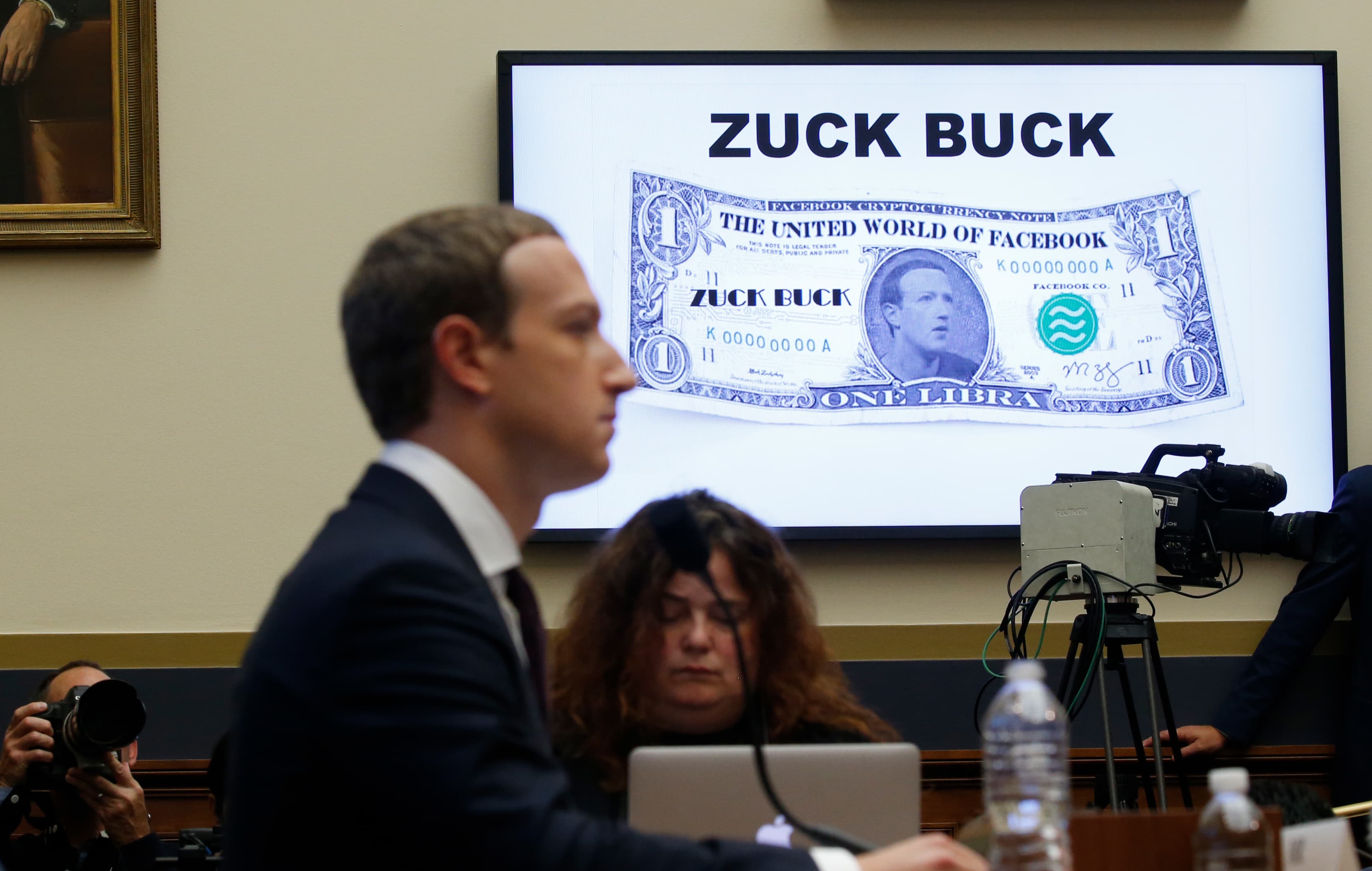A monitor displays a “Zuck Buck” as Mark Zuckerberg, chief executive officer and founder of Facebook Inc., testifies during a House Financial Services Committee hearing in Washington, D.C., U.S., on Wednesday, Oct. 23, 2019.
Andrew Harrer | Bloomberg | Getty Images
In a year when examining the power of the Big Tech companies became a major theme across federal the government, the top five major players spent millions of dollars lobbying Congress on issues ranging from election integrity to immigration.
Tech companies disclosed their lobbying spending for the fourth quarter of 2020 late Thursday night, revealing big swings in spending from 2019 to 2020. Combined, however, the five Big Tech companies (Amazon, Apple, Facebook, Google and Microsoft) spent slightly less in 2020 than in the year before at $61.09 million, a 1.8% decrease.
In 2020, all of those companies (except Microsoft) saw their businesses probed by the House Judiciary subcommittee on antitrust, which concluded each held monopoly power. Facebook and Google both saw new antitrust lawsuits from both state and federal enforcers and Amazon and Apple are both said to be under investigation by federal agencies. Meanwhile, the election and the pandemic brought to the forefront other questions about the tech companies’ practices, including they moderate content, display ads and protect users’ privacy.
For the full year 2020, Facebook spent more than any other Big Tech company at $19.68 million. It increased its lobbying spending by 17.8% from 2019 in a year when the Federal Trade Commission and 48 attorneys general from states and territories filed antitrust complaints against the business.
In the fourth quarter, Facebook lobbied on issues including copyright reform, election integrity, content policy, immigration and international tax policies.
Amazon spent the second most of its Big Tech peers in 2020 at $17.86 million, up 10.7% from the year before. In the fourth quarter, Amazon lobbied on issues including broadband, intellectual property, postal reform, health care and the Justice in Policing Act.
Google notably spent 36.2% less on lobbying in 2020 compared to 2019, totaling $7.53 million. It had already reduced its lobbying spending by more than 44% from 2018 to 2019 when it offloaded several external lobbying firms.
In the fourth quarter of 2020, Google engaged Congress on topics including online advertising regulation, student digital privacy, pandemic contact tracing and competition law.
TikTok owner ByteDance, a Chinese company, notably ramped up spending in 2020 as the Trump administration attempted to bar it from operating the app in the U.S. and get it to sell TikTok to a new owner, pointing to alleged security concerns with the China-based parent company. The status of that effort is still pending court action, but it’s possible the Biden administration could take a different approach to the business.
ByteDance, which only registered to lobby in 2019 and spent less than $300,000 that year, spent $2.58 million in 2020 on its efforts, representing a 855.6% increase. It lobbied on issues including a bill meant to bar TikTok from government-owned devices, content moderation and trade in the fourth quarter.
Lyft also increased its lobbying spending significantly to $2.19 million in 2020, representing a 135.5% increase from the year before. The company was part of a coalition including Uber and DoorDash to pass Proposition 22 in California that would allow them to continue hiring drivers as independent workers rather than employees, spending millions of dollars on that state effort alone. The measure ultimately passed.
On the federal level, Lyft focused its efforts in the fourth quarter on similar issues, according to its public filing, including “the future of work and portable benefits,” tax filing issues for independent contractors and work classification.
Uber lobbied on some similar issues like “flexible work” as well as others, like issues related to the Covid-19 vaccine, according to its public filing for the fourth quarter. But it actually spent slightly less on federal lobbying this year compared to last at $2.33 million, a 1.3% decrease.
